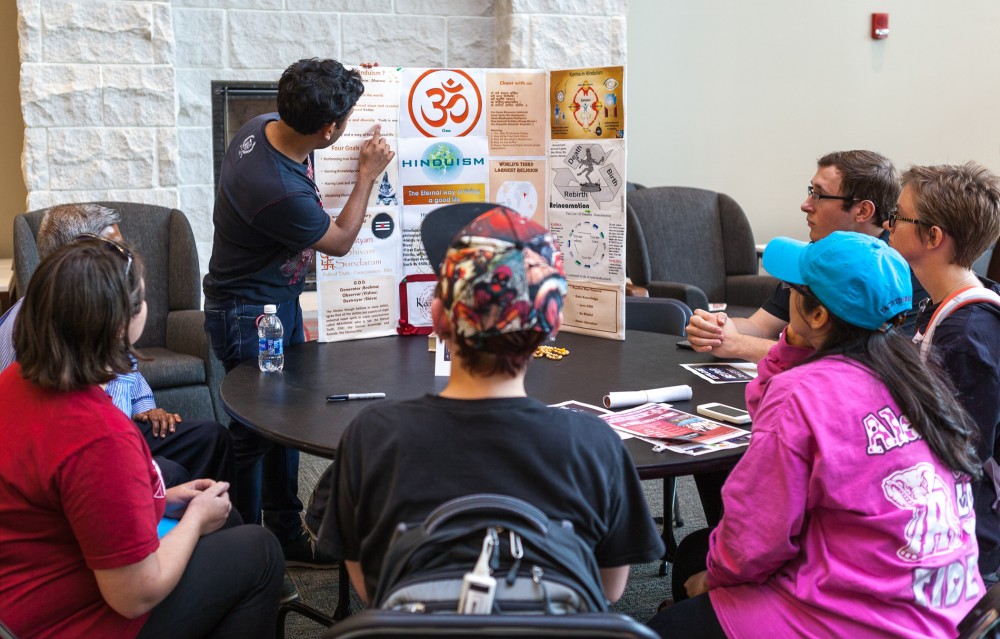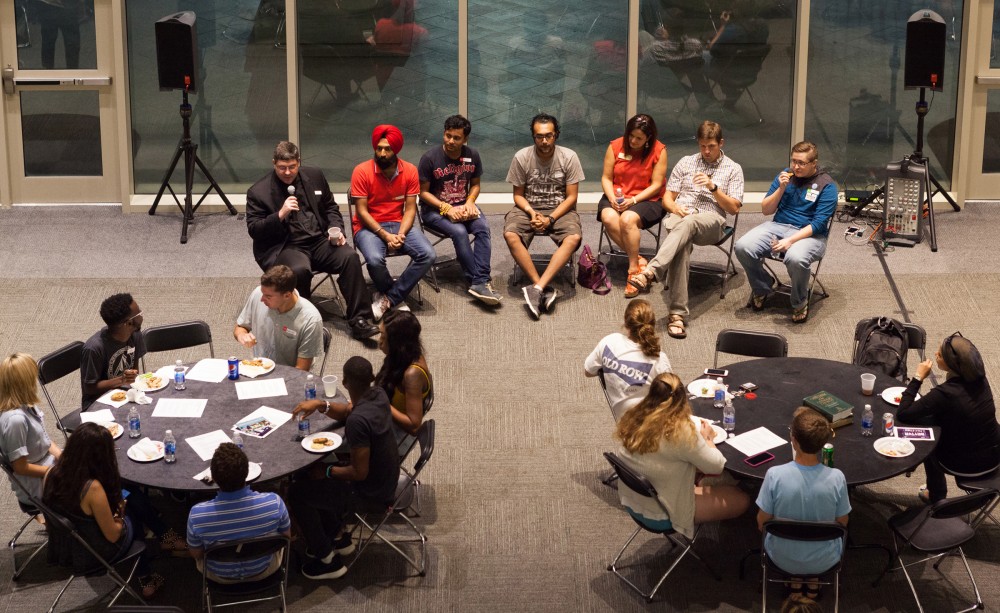Photos by Jianlong Yang | CCBP Student
Author: Taylor Armor | CCBP Graudate Assistant
TUSCALOOSA– Both religious and non-religious organizations filled the Ferguson Center’s Great Hall to exchange views and answer questions about their respective beliefs at the Explore Better Together interfaith event on August 22 sponsored by Crossroads Community Center.
Students, faculty, Crossroads staff and community members participated in the night’s “speed faithing” activity during an event filled with conversation and laughter. Similar to speed dating, groups of attendees met with representatives from a religious or non-religious organization and after seven minutes moved to a new one.
Attendees met with the following religious and non-religious representatives: Zyad Jamalallail of the Muslim Student Association; Alex Hoffman of the Crimson Secular Student Alliance; Father Rick Chenault of St. Francis of University Parish; James Goodlet and Kate Broach of UKirk (Presbyterian) Campus Ministry; Lisa Besnoy of the Hillel Student Center; Parnab Das of the Indian Students Association, representing Hinduism; and Harshpal Singh, representing Sikhism, the world’s fifth largest religion, originating in the Punjab region of northern India.
Paige Bolden, coordinator of Intercultural Engagement at Crossroads, said interfaith activities like these give participants a chance to meet someone different than them, and ask “awkward questions” about their respective beliefs people avoid in everyday conversation. “We hope that they gain a better understanding (and) that this event helps build relationships and bridges between the religious and non-religious on campus,” Bolden said.

Throughout the event, Lane McLelland, director of Crossroads, encouraged attendees to ask questions, listen and learn together, but that it was not a night of “challenging each other. Participating in this event and other Better Together programs at UA provides members of our campus community the opportunity to foster new connections for increased interfaith understanding,” McLelland said. “The strong relationships that are built through these dinners and dialogues and doing community service work together will be important for building bridges between groups on campus who might normally be divided by religious and philosophical differences.”
Bridging the divide between religious and non-religious beliefs has been central to the Crossroads Interfaith Initiative, which has modeled its work after the Interfaith Youth Core (IFYC.org). This interfaith movement promotes religious pluralism through respect for diverse religious and non-religious identities; mutually inspiring relationships between people of different backgrounds and traditions; and common action for the common good.
Carlisle Wishard, a senior in astrophysics from Washington, D.C., admitted that being an atheist in Alabama has been a different experience for her than living in her hometown. Wishard, a member of the Crimson Secular Student Alliance, said that the organization’s involvement in UA’s Better Together: Interfaith Youth Core program has fostered a sense of belonging for non-religious students and has opened dialogue with religious organizations on campus.
“If you don’t come from an area that is particularly religiously diverse,” Wishard said, “this is one of few opportunities to meet people that don’t think exactly like you. So I think it’s good for everyone, myself included, for people to learn about different religions and not feel bad about asking questions.”
For Parnab Das, the representative of the Hindu beliefs and the University’s Indian Student Association, the curiosity of the Explore Better Together participants inspired him to become more familiar with his beliefs and practices by the next event. “I’m not here to speak for the whole Hindu society,” Das said. “I’m here to present my beliefs and faiths about Hinduism. So, I feel I need to brush up on these things, so I can be more concrete, more specific and more knowledgeable and transparent for the next time that I’m here.”

A doctoral student in civil engineering, Das brought along a trifold poster board completely covered in information on Hinduism in an anticipated effort to answer any questions from his audience.
“We have so many wrong beliefs about other religions,” Das said. “This is a good platform to work on that, to question other religions and make ourselves knowledgeable, and to live a transparent life.”
For Gevin Brown, a senior from Birmingham, Ala. majoring in design for social inclusion, the event also reinforced that culture and religion aren’t interchangeable in understanding faith-based practices and beliefs.
“While I was at the Muslim [Islam] table,” Brown said. “[Zyad Jamalallail] mentioned that certain cultures in his country oppress women but his religion does not by any means. They go together very well, but it’s important to note the difference.” Brown, who has worked as a Crossroads student intern since his freshman year, has found that interfaith dialogue positively benefits the UA community.
“These kinds of events show and create cohesion,” Brown said. “They show that even though you’re ‘XYZ’, you can still come into these uncomfortable places and make friends and grow as a person.”
UA community members interested in participating in upcoming Better Together events should contact the Crossroads Community Center at 205-348-6930 or email crossroads@ua.edu.